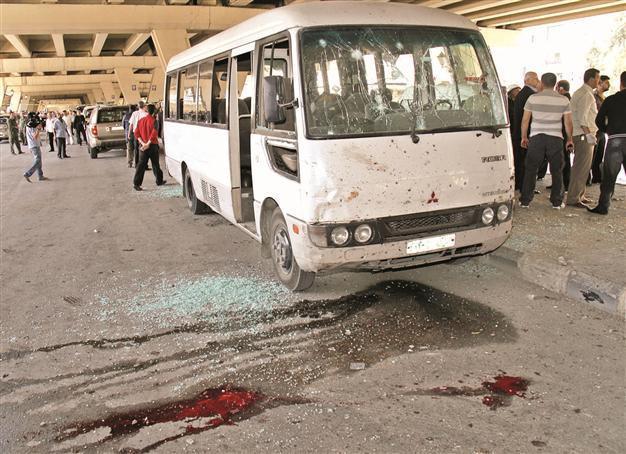Bombs hit Syria as peace doubts grow
DAMASCUS

Syrian investigators (R) gather next to a damaged police bus that was attacked by an explosion in the Midan neighborhood of Damascus on April 27. A suicide bomber blew
himself up across the street from a mosque in Damascus, killing 11 people, state TV said. Thousands of Syrians protested elsewhere to denounce persistent violence.
A deadly suicide bombing rocked the Syrian capital on April 27, killing 11 people and fuelling growing skepticism about hopes for the success of a U.N.-backed peace plan, while 15 more observers are scheduled to arrive in the country as of April 30.
Amid the unrest, demonstrations were taking place after weekly Muslim prayers in flashpoint cities such as Hama, where shelling by government troops has reportedly killed more than 100 people since April 23. At least 11 people died and dozens were wounded by Friday’s blast, which hit as worshippers were leaving weekly prayers at the nearby Zein al-Abidin mosque in the central Midan district, state television said. The report blamed “terrorists,” and said civilians and security force members were among the casualties. A separate blast hit an industrial zone of Damascus, but there were no reports of casualties, and three security agents were wounded in a blast in the coastal city of Banias, the Syrian Observatory for Human Rights said. But U.N. chief Ban Ki-moon said the regime was in contravention of a six-point peace deal by keeping troops and heavy weapons in urban areas, and expressed alarm about reports of population centers being shelled.
On April 26, 22 people died in
Syria, most of them civilians, the Britain-based Observatory said. And overnight clashes between troops and rebels in the central city of Homs killed at least one army deserter and wounded another 15, it added. Also April 27, activists reported that thousands of people protested in the northern city of Aleppo, the central region of Hama and the northern province of Idlib.
A small advance team is on the ground, and will be doubled to 30 by month’s end, a U.N. official said on April 27. The U.N. said Ban “remains deeply troubled by the continued presence of heavy weapons, military equipment and army personnel in population centers.” This was “in contravention of the Syrian government’s commitments to withdraw its troops and heavy weapons from these areas,” he said.
US Ambassador Susan Rice said the Security Council must be ready to order sanctions if Syria flouts commitments to halt violence. The Syrian National Council, the main opposition group in exile, has called for an emergency Security Council meeting to discuss a resolution to protect civilians. The Arab League said it would ask the U.N. to ensure the immediate protection of civilians, but without going as far as demanding the use of force. “The entire world is waiting for a truce and the observers to be deployed, but unfortunately the fighting has not stopped and every day new victims die,” Arab League chief Nabil al-Arabi said. The EU also criticized Damascus on April 27 as its foreign policy chief Catherine Ashton voiced concern about the continued violence.
Russia however, said violations of the cease-fire were still being committed by both sides, but blamed the opposition overall. “Most often this occurs because of provocative actions from the armed opposition, which often force the Syrian security forces to open fire in response,” Russia’s Foreign Ministry spokesman Alexander Lukashevich said. Still, he added, the level of violence in the country has declined considerably since the observers arrived.
Compiled from AFP, AP and Reuters stories by the Daily news staff.
